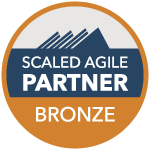Take on the role of a Scrum Master in a scalable environment and ensure the success of your teams!
Extending agility at the organisational level requires more than just team-level Scrum skills. SAFe® Scrum Master training (SSM certification) gives you the skills to effectively support agile teams in a scalable development environment. You will learn how to lead iterations, manage PI planning and improve team collaboration across organisational boundaries.
The SAFe Scrum Master with SSM Certification training is also available in Finnish, learn more about it here.
Location
Helsinki
Training formats
Classroom
Remote
Duration
2 days
Price
Certificate
Kyllä
For whom is the training for?
If you work as a Scrum Master, team leader, project manager or agile development team, this training will give you the tools you need to succeed in a scalable organisation.
Do you want to ensure your team works efficiently and delivers value in the most agile way possible? Do you need an in-depth understanding of how the SAFe model manages iterations and design cycles? This training provides clear and concrete methods for managing teams, PI planning and optimising agile development. You will gain hands-on experience on how to create effective teams, improve collaboration and drive continuous improvement in a SAFe environment. You will also develop your skills as a coach and solver to ensure that your team works seamlessly with other stakeholders.
The training will enable you to complete the SAFe Scrum Master (SSM) certification, which will strengthen your skills and help you take your career to the next level.
Additional information for participants
- No prior knowledge is required, everyone is welcome to attend the training. However, it will help participants to understand the content of the training if they have previous experience in agility.
- Remote training (and hybrid training for remote participants) will make use of virtual whiteboards (e.g. Mural/Miro), in which case it is an advantage to be familiar with their use.
- The training material is in English
- The training will prepare participants to take the SAFe Agilist certification test, which will give those who pass one year access to the SAFe Studio portal and its comprehensive range of materials. One attempt at the certification test is included in the price of the training.
- For more information, visit: SAFe® Scrum Master Certification Course | SSM Training

IMPROVE
your understanding of the role of the Scrum Master in a SAFe environment.

LEARN
how to facilitate effective PI design and agile work planning.

DEVELOPE
your skills as a team coach and challenge resolver.

GAIN
practical experience of iterative working and continuous improvement.
Programme
Day 1
- Key concepts and principles of agile development
- Scrum values and practices
- How agile teams are positioned within a SAFe organization?
- Scrum Master’s role and responsibilities within the team
- How to identify an effective Scrum Master?
- How does the Scrum Master support team events?
- Enhancing teamwork and developing high-performing teams
- Communication and collaboration with other teams
- How does the Scrum Master coach team members?
- How to prepare for PI Planning?
- Value-driven Features and user stories
- How to estimate the size of work items?
Day 2
- Exercise: PI Simulation
- PI Objectives and Business Value
- The Scrum Master’s role in facilitating PI Planning
- Iteration planning and progress tracking
- How to manage and refine the development backlog?
- How are iteration results reviewed?
- Iteration retrospective and continuous improvement
- DevOps as part of SAFe
- What does the CALMR approach to DevOps mean?
- What is the significance of the IP iteration?
- Inspect & Adapt session and reviewing PI outcomes
- What happens in a problem-solving workshop?
- Final discussions
- What’s next after the course? Certification path
The remote delivery of this training in Finnish is provided with Loihde Advance and in English with Olingo. Both are Scaled Agile bronze level partners.

This training is provided with WikiAgile.

You might be interested in these courses:


